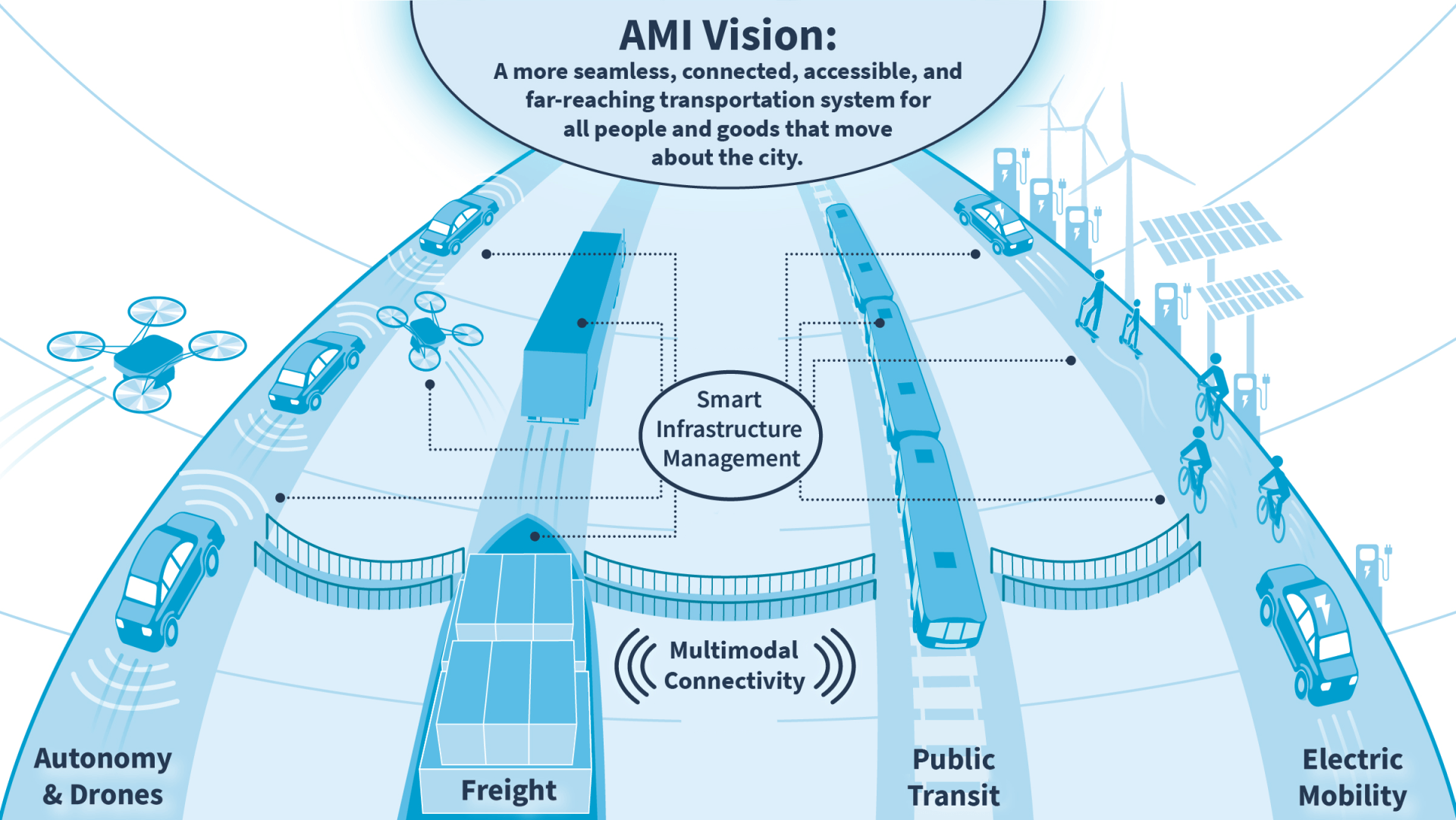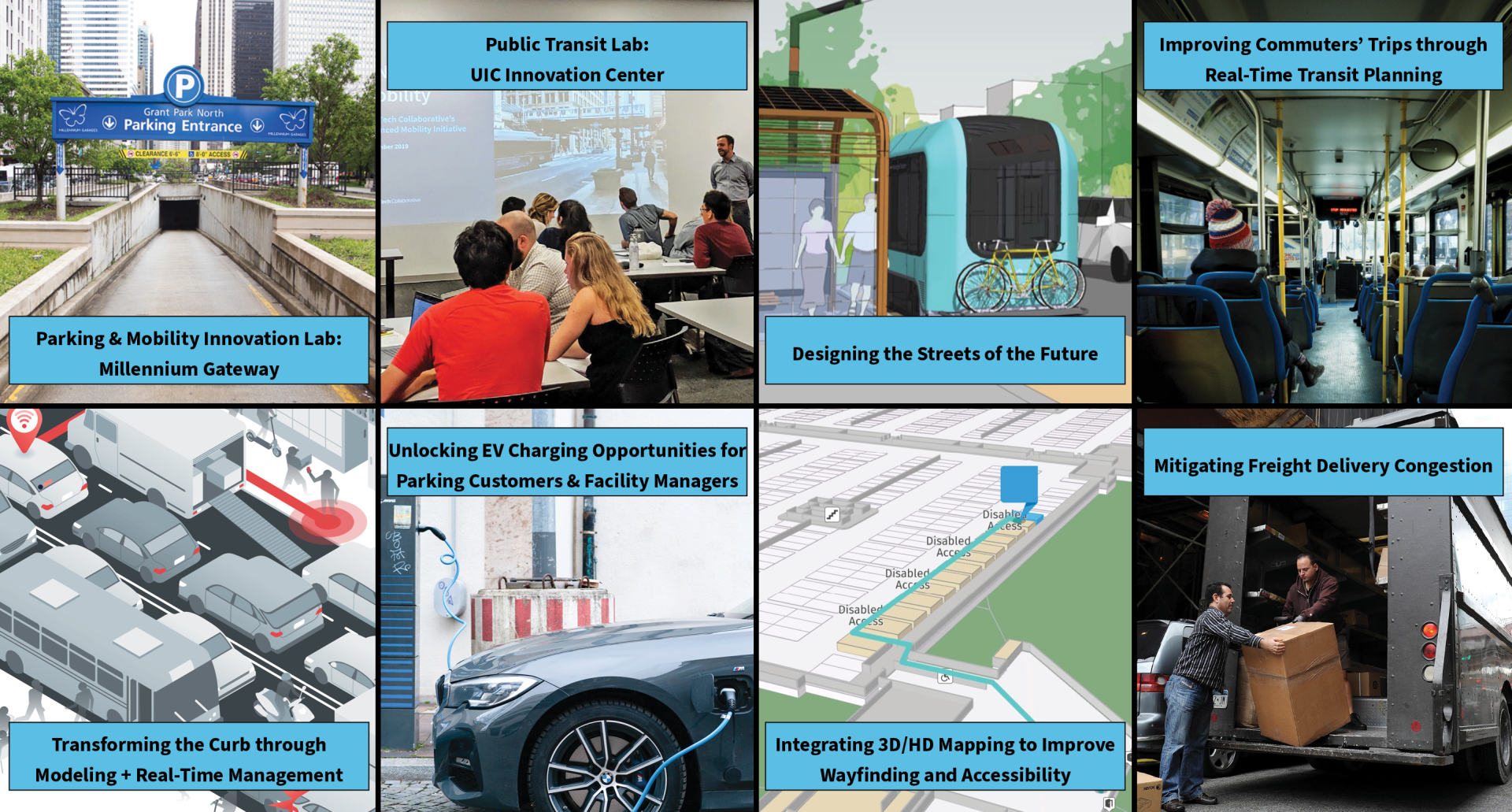Two Years In, City Tech’s Advanced Mobility Initiative Continues to Drive Collaborative Innovation
Over 70 Partners Have Engaged on 16 Solutions to Improve Urban Mobility Efficiency and Accessibility
Our cities’ transportation systems
are in a state of disruption. We have multiple modes to choose from – trains,
buses, cars, rideshare, bikes, and even scooters – and an increased need to
more easily navigate between these systems. Electrification feels just around
the corner with the rise of personal, freight, and fleet electric vehicles, raising
questions about the infrastructure needed to support them. Meanwhile, next-day
and next-hour deliveries are becoming a consumer expectation, causing
congestion, increased costs, and pollution. These critical transportation
challenges call for coordinated, collaborative action and forward-looking
solutions that transform our mobility systems.
Two years ago, City Tech
Collaborative (City Tech) launched a new Advanced Mobility Initiative
and embarked
on a multi-year journey to create more seamless, connected, accessible, and
far-reaching urban transportation systems for people and goods. Since 2019, the
effort has developed 16 projects and engaged over 70 partners to address mobility
challenges affecting cities across the globe.
Tackling a Complex Challenge
If we ignore today’s evolving mobility
challenges, we can expect a future of increased congestion, longer travel times,
and exacerbated transit inequity. Strategy and insights partner McKinsey & Company’s research has
shown that without coordinated efforts to mitigate population changes, emerging
technologies, and shifting transit trends, by 2030 Chicago residents can expect
25% more passenger miles traveled, a 50% decline in commutes using mass
transit, a 16% increase in commute time, and a 15% increase in congestion from
today. Cities everywhere face similar challenges, and municipalities,
businesses, and residents are calling for targeted, practical solutions to change
this grim trajectory.
Urban freight and mobility
challenges span sectors, jurisdictions, industries, and residents, and local conditions
and priorities determine whether solutions will or will not work for any given
community. City Tech creates the structure necessary for collaborative innovation
through our solution development methodology; working with cross-sector partners,
we bring multiple perspectives to the table to discover opportunities, define and
implement new solutions, and scale to new markets. This approach helps our solutions
thrive where other collaborations fall short.
Led by Founding Members Bosch, HERE
Technologies, and Microsoft, City
Tech’s Advanced Mobility Initiative is integrating leading research, emerging
technology, and cities’ transportation priorities to develop comprehensive
solutions. With leadership and input from national and international partners –
including Chicago, Los Angeles, New York, London, and more than 25 industry and
civic partners – City Tech developed an
urban transportation innovation roadmap
that guides our efforts to solve
today’s most pressing mobility challenges.
System-Level Impact
With this framework in place, the Advanced Mobility Initiative has developed activities related to multimodal connectivity , public transit access , freight , smart infrastructure management , electric mobility, and AV/drone adoption. Solutions have ranged from managing congestion at city curbs to providing real-time insights on bus occupancy. The Initiative has also worked to integrate the parking industry more fully into broader mobility systems through the Millennium Gateway Innovation Lab. Anchored at the largest underground public parking system in North America, the Innovation Lab’s Founding Members Millennium Garages, SP+, and Arrive are leading the effort to expand the Initiative’s reach through additional solutions to optimize electric vehicle charging, improve indoor mapping and wayfinding, and position parking facilities as urban freight and mobility hubs.
In parallel with technology integration and deployment, the Advanced Mobility Initiative is also working to ensure that the solutions we create are inclusive, accessible, and scalable across urban markets. City Tech’s thought leadership programming and publications amplify Advanced Mobility Initiative participants’ work through roundtables, workshops, conferences, and virtual events that have reached hundreds of national subject experts and city leaders. City Tech’s resident engagement program solicits direct resident input on challenges and solutions that affect their communities. As part of our solution development methodology, City Tech projects follow a racial equity and inclusion process and toolkit established to ensure that the need for and impact of new solutions are understood by collaborative partners. These tools ensure that we are evaluating racial equity and inclusion throughout the course of all of our projects, as well as across the larger portfolio. Together, these efforts inform, validate, and assess our work as it relates to the Advance Mobility Initiative’s vision of seamless and frictionless transportation systems.
Key Learnings
At its outset, the Advanced
Mobility Initiative sought to address the most important transportation issues
facing our cities, but no one could have anticipated exactly how these last two
years would unfold. City Tech and our partners have adapted our approach in
response to the COVID-19 pandemic and industry-shaping trends, incorporating
several key learnings along the way.
1.) Expanding Roles,
Responsibilities, and Opportunities:
Cities’ mobility systems are a complex
web of tech companies, public and private transit providers, asset owners and
operators, and government agencies that make our trips possible every day. The
Advanced Mobility Initiative provides a framework for these stakeholders to
work together to integrate services, focus on residents’ needs, and improve
their customers’ experience. Our future seamless transportation system will not
be governed by a single provider; we must create and expand roles,
responsibilities, and opportunities for each of these groups, together.
2.) Seizing New Opportunities to
Shape Transportation Demand:
Historically, transportation service providers
have sought to keep up with demand by adding more vehicles, routes, or services.
Predictive modeling tools help reduce uncertainty, but they still cast service
providers in a reactive role. In addition to improving supply-side
intelligence, City Tech and our partners are embracing opportunities to
proactively shape demand through data sharing and incentives. Demand shaping
can take the form of sharing
previously inaccessible information with customers and partners, nudging public
transit commuters to adjust their travel plans, or using data and dynamic
pricing to manage curb space.
By learning from other sectors such as consumer products
and energy that have invited their customers to take an active part in product
or solution development, urban transportation can deliver better user
experiences and reduce operating cost. Achieving this elusive goal, however,
demands new capabilities, tools, policies, and partnerships to put information
and physical assets to their highest and best use.
3.) Applying Fundamental Tech Capabilities
to Specific Transportation Challenges
: Recent breakthroughs in
fundamental technologies – including connected sensors, big data management, edge
compute, 5G, artificial intelligence, and machine learning – are finally
finding their way into urban transportation. Large technology companies have
invested heavily in these transformational capabilities, but it’s up to local
governments, fleet and freight operators, and urban residents to help ensure
that new tools are deployed in ways that are useful, relevant, and respectful
of unique community needs and expectations. As cities and their partners move
from single solutions to building broader innovation portfolios with diverse
use cases, focusing on these foundational technology layers can create
efficiencies and support broader partnerships at scale. Raw tech may get us 80%
of the way to game-changing solutions, but customizing fundamental capabilities
to fit local conditions is the cultural and intellectual “last mile” of
transportation innovation.
4.) Scaling Beyond the Pilot:
A
successful pilot is encouraging. Now how do we take it to the next level? We
must design solutions for scalability from the very beginning – and include the
right partners to achieve it. In addition to tech and data partners, it is
critical we include organizations with expertise or specific capabilities to
take a solution to market and scale to other cities. With a focus on enterprise
implementation, this solution team member can best scope, define, and evaluate metrics,
successes, and shortcomings relative to future implementation. We must also identify
subsequent funding and/or investment sources who are able to finalize post-pilot
product development and customization required for enterprise implementation. Engaging
the right partners, focusing on broader applications, and priming markets and
future customers allow solutions to thrive far beyond an initial pilot.
5.) Focusing on the End Users:
Successful public-facing technologies rely upon direct resident engagement and
community-focused design. The Advanced Mobility Initiative drove specific
efforts such as our partnership
with the University of Illinois at Chicago Innovation Center to define public
transit needs and potential solutions. Students took a user-centered approach
to understand the pains and gains of using public transit; by speaking with residents,
understanding the experiences of different types of users, and taking a
cross-disciplinary approach, students were able to discover inequities and
identify solutions for specific demographics and marginalized customers. Prioritizing
equity, accessibility, and meeting gaps for users will always lead to a stronger
and more impactful solutions.
Looking Forward
Despite all that the Advanced
Mobility Initiative has achieved, there is still so much to do. We will identify the partnerships and
technologies that can support innovative funding models for shared, efficient mobility
options that reduce our climate impact. Consistent with our work to date, we
will be exploring opportunities to reveal the use and demand for transportation
– opening a dialogue around how these data and tools can be used to guide the
planning, investment, and operations of our shared infrastructure to meet our
community goals.
The last two years have ushered dramatic
changes in how people and goods move about cities, placing new demands on service
providers, infrastructure, and regulators. As post-COVID activity resumes, that
pace of change will only increase.
Vehicle electrification is reaching a long-awaited tipping point. Though full automation may still be years
away, connected vehicles will begin to share and receive an unprecedented volume
of information with each other and their surroundings. Increasing competition for
urban streets and curbs will force cities to rethink pricing, management, and
integration of public and private spaces. All of these trends (and more) will
ensure plenty of need for continued innovation, collaboration, new market
development, community engagement, and thoughtful deployment.
Urban mobility systems are already
complicated, and collaboration is difficult. But City Tech’s Advanced Mobility
Initiative proves that when we work together, committed partners can build
lasting, dynamic solutions with greater impact than anyone could accomplish
alone.
For more information about City
Tech’s Advanced Mobility Initiative, visit https://www.citytech.org/mobility
or
contact City Tech at Collaborate@CityTech.org
to get involved.
About City Tech Collaborative
City Tech Collaborative (City Tech) is an urban solutions accelerator that
tackles problems too big for any single sector or organization to solve alone.
City Tech’s work uses IoT sensing networks, advanced analytics, and urban
design to create scalable, market ready solutions. Current initiatives address
mobility, healthy cities, connected infrastructure, and emerging growth
opportunities. City Tech was born and raised in Chicago, and every city is a
potential partner. Visit www.CityTech.org
for
more information and follow us on Twitter and LinkedIn.
About the Advanced Mobility
Initiative
City Tech
Collaborative’s Advanced Mobility Initiative is an effort involving over 25
industry partners to create a more seamless and frictionless transportation
system with increased accessibility and reach for urban residents. The
Initiative includes six impact areas that City Tech will address through
thought leadership, resident engagement, and solution development.
Advanced Mobility Initiative Founding Members include Bosch, HERE Technologies and Microsoft.
McKinsey
& Company serves as Strategy and Insights Partner.
Industry Leads and Strategic Partners include: Millennium Garages, National Express Group, AECOM, Crown Castle, Skidmore, Owings, and Merrill, Intel, Verizon, Smarking, SP+, Arrive, Argonne
National Laboratory’s Center for Transportation Research, the Chicago Metropolitan Agency for
Planning, the City
of Chicago, CityBase Inc., the Illinois Autonomous Vehicles Association, Innova EV, London and Partners,
the Metropolitan Planning Council, MobilityE3, MUVE Inc
., Northwestern
University’s Transportation Center, project44,
the Shared Use Mobility Center, SpotHero, and Via Transportation.


